
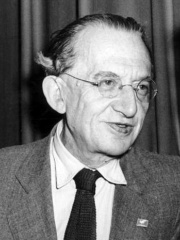

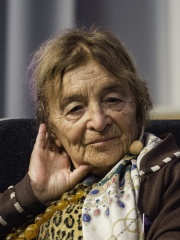

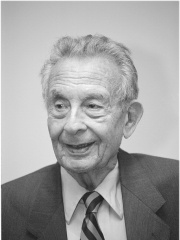
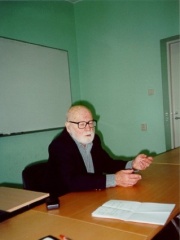

The Most Famous
PHILOSOPHERS from Hungary
This page contains a list of the greatest Hungarian Philosophers. The pantheon dataset contains 1,267 Philosophers, 10 of which were born in Hungary. This makes Hungary the birth place of the 21st most number of Philosophers behind Belgium, and Iraq.
Top 10
The following people are considered by Pantheon to be the top 10 most legendary Hungarian Philosophers of all time. This list of famous Hungarian Philosophers is sorted by HPI (Historical Popularity Index), a metric that aggregates information on a biography's online popularity. Visit the rankings page to view the entire list of Hungarian Philosophers.

1. Rudolf Steiner (1861 - 1925)
With an HPI of 80.38, Rudolf Steiner is the most famous Hungarian Philosopher. His biography has been translated into 63 different languages on wikipedia.
Rudolf Joseph Lorenz Steiner (German: [ˈʃtaɪnɐ]; 27 or 25 February 1861 – 30 March 1925) was an Austrian New Age guru, philosopher, occultist, social reformer, architect, esotericist, and claimed clairvoyant. Steiner gained initial recognition at the end of the nineteenth century as a literary critic and published works including The Philosophy of Freedom. At the beginning of the twentieth century he founded an esoteric spiritual movement, anthroposophy, with roots in German idealist philosophy and theosophy. His teachings are influenced by (Christian) Gnosticism or neognosticism. Many of his ideas are pseudoscientific. He was also prone to pseudohistory. In the first, more philosophically oriented phase of this movement, Steiner attempted to find a synthesis between science and spirituality by developing what he termed "spiritual science", which he sought to apply the clarity of thinking characteristic of Western philosophy to spiritual questions, differentiating this approach from what he considered to be vaguer approaches to mysticism. In a second phase, beginning around 1907, he began working collaboratively in a variety of artistic media, including drama, dance and architecture, culminating in the building of the Goetheanum, a cultural centre to house all the arts. In the third phase of his work, beginning after World War I, Steiner worked on various ostensibly applied projects, including Waldorf education, biodynamic agriculture, and anthroposophical medicine. Steiner advocated a form of ethical individualism, to which he later brought a more explicitly spiritual approach. He based his epistemology on Johann Wolfgang von Goethe's world view in which "thinking...is no more and no less an organ of perception than the eye or ear. Just as the eye perceives colours and the ear sounds, so thinking perceives ideas." A consistent thread that runs through his work is the goal of demonstrating that there are no limits to human knowledge.

2. György Lukács (1885 - 1971)
With an HPI of 75.73, György Lukács is the 2nd most famous Hungarian Philosopher. His biography has been translated into 56 different languages.
György Lukács (born Bernát György Löwinger; Hungarian: Szegedi Lukács György; German: Georg Bernard Lukács; 13 April 1885 – 4 June 1971) was a Hungarian Marxist philosopher, literary historian, literary critic, and aesthetician. He was one of the founders of Western Marxism, an interpretive tradition that departed from the Soviet Marxist ideological orthodoxy. He developed the theory of reification, and contributed to Marxist theory with developments of Karl Marx's theory of class consciousness. He was also a philosopher of Leninism. He ideologically developed and organised Vladimir Lenin's pragmatic revolutionary practices into the formal philosophy of vanguard-party revolution. Lukács was especially influential as a critic due to his theoretical developments of literary realism and of the novel as a literary genre. In 1919, he was appointed the Hungarian Minister of Culture of the government of the short-lived Hungarian Soviet Republic (March–August 1919). Lukács has been described as the preeminent Marxist intellectual of the Stalinist era, though assessing his legacy can be difficult as Lukács seemed both to support Stalinism as the embodiment of Marxist thought, and yet also to champion a return to pre-Stalinist Marxism.

3. Imre Lakatos (1922 - 1974)
With an HPI of 72.32, Imre Lakatos is the 3rd most famous Hungarian Philosopher. His biography has been translated into 52 different languages.
Imre Lakatos (UK: , US: ; Hungarian: Lakatos Imre [ˈlɒkɒtoʃ ˈimrɛ]; 9 November 1922 – 2 February 1974) was a Hungarian philosopher of mathematics and science, known for his thesis of the fallibility of mathematics and its "methodology of proofs and refutations" in its pre-axiomatic stages of development, and also for introducing the concept of the "research programme" in his methodology of scientific research programmes.

4. Ágnes Heller (1929 - 2019)
With an HPI of 68.58, Ágnes Heller is the 4th most famous Hungarian Philosopher. Her biography has been translated into 35 different languages.
Ágnes Heller (12 May 1929 – 19 July 2019) was a Hungarian philosopher and lecturer. She was a core member of the Budapest School philosophical forum in the 1960s and later taught political theory for 25 years at the New School for Social Research in New York City. She lived, wrote and lectured in Budapest.
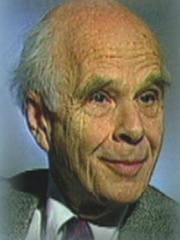
5. Ervin László (b. 1932)
With an HPI of 60.96, Ervin László is the 5th most famous Hungarian Philosopher. His biography has been translated into 18 different languages.
Ervin László (Hungarian: [ˈɛrvin ˈlaːsloː]; born 12 June 1932) is an American philosopher of science, systems theorist, integral theorist, originally a classical pianist. He is an advocate of the theory of quantum consciousness.

6. István Mészáros (1930 - 2017)
With an HPI of 57.52, István Mészáros is the 6th most famous Hungarian Philosopher. His biography has been translated into 17 different languages.
István Mészáros (UK: , US: , Hungarian: [ˈiʃtvaːn ˈmeːsaːroʃ]; 19 December 1930 – 1 October 2017) was a Hungarian Marxist philosopher. Described as "one of the foremost political philosophers of the late twentieth and early twenty-first centuries" by Monthly Review, Mészáros wrote mainly about the possibility of a transition from capitalism to socialism. His magnum opus, Beyond Capital: Toward a Theory of Transition (1995), was concerned not only with this theme but provided a conceptual distinction between capitalism and capital, and an analysis of the current capitalist society and its "structural crisis". He was interested in the critique of the "bourgeois ideology", including the idea of "there is no alternative", and he also elaborated analysis on the failures of "real socialism".

7. George Gerbner (1919 - 2005)
With an HPI of 55.54, George Gerbner is the 7th most famous Hungarian Philosopher. His biography has been translated into 18 different languages.
George Gerbner (August 8, 1919 – December 24, 2005) was a professor of communication and the founder of cultivation theory. He taught at Temple University, Villanova University, and the University of Pennsylvania.

8. Thomas Sebeok (1920 - 2001)
With an HPI of 55.30, Thomas Sebeok is the 8th most famous Hungarian Philosopher. His biography has been translated into 19 different languages.
Thomas Albert Sebeok (Hungarian: Sebők Tamás, pronounced [ˈʃɛbøːk ˈtɒmaːʃ]; November 9, 1920 – December 21, 2001) was a Hungarian-born American polymath, semiotician, and linguist. As one of the founders of the biosemiotics field, he studied non-human and cross-species signaling and communication. He is also known for his work in the development of long-term nuclear waste warning messages, in which he worked with the Human Interference Task Force (established 1981) to create methods for keeping the inhabitants of Earth away from buried nuclear waste that will still be hazardous 10,000 or more years in the future.

9. Victor Basch (1863 - 1944)
With an HPI of 53.96, Victor Basch is the 9th most famous Hungarian Philosopher. His biography has been translated into 15 different languages.
Basch Viktor Vilém, or Victor-Guillaume Basch (18 August 1863/1865, Budapest – 10 January 1944) was a French Jewish politician and professor of germanistics and philosophy at the Sorbonne descending from Hungary. He was engaged in the Zionist movement, in the Ligue des droits de l'homme (president from 1926 to 1944) and in Anti-Nazism.
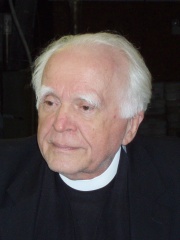
10. Stanley Jaki (1924 - 2009)
With an HPI of 52.28, Stanley Jaki is the 10th most famous Hungarian Philosopher. His biography has been translated into 16 different languages.
Stanley L. Jaki (Jáki Szaniszló László; 17 August 1924 – 7 April 2009) was a Hungarian-born priest of the Benedictine order. From 1975 to his death, he was Distinguished University Professor at Seton Hall University, in South Orange, New Jersey. He held doctorates in theology and in physics and was a leading contributor to the philosophy of science and the history of science, particularly to their relationship to Christianity. In 2018, Jaki was named one of five Catholic scientists "that shaped our understanding of the world" by Aleteia; the other four are: Copernicus, Gregor Mendel, Giuseppe Mercalli and Georges Lemaître.
People
Pantheon has 10 people classified as Hungarian philosophers born between 1861 and 1932. Of these 10, 1 (10.00%) of them are still alive today. The most famous living Hungarian philosophers include Ervin László. The most famous deceased Hungarian philosophers include Rudolf Steiner, György Lukács, and Imre Lakatos.
Living Hungarian Philosophers
Go to all RankingsDeceased Hungarian Philosophers
Go to all RankingsRudolf Steiner
1861 - 1925
HPI: 80.38
György Lukács
1885 - 1971
HPI: 75.73
Imre Lakatos
1922 - 1974
HPI: 72.32
Ágnes Heller
1929 - 2019
HPI: 68.58
István Mészáros
1930 - 2017
HPI: 57.52
George Gerbner
1919 - 2005
HPI: 55.54
Thomas Sebeok
1920 - 2001
HPI: 55.30
Victor Basch
1863 - 1944
HPI: 53.96
Stanley Jaki
1924 - 2009
HPI: 52.28
Overlapping Lives
Which Philosophers were alive at the same time? This visualization shows the lifespans of the 9 most globally memorable Philosophers since 1700.

